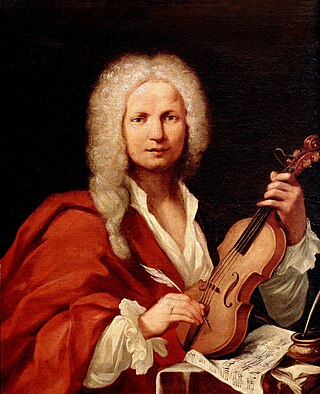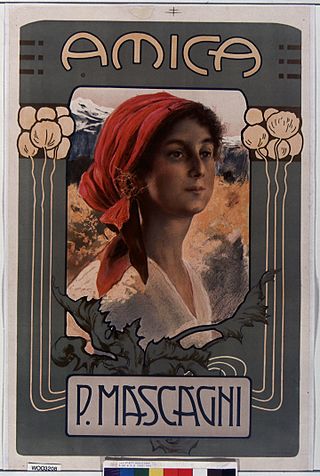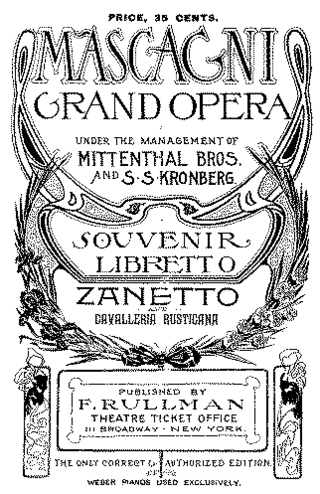Recordings
Conductor: Sandro Volta. Orchestra dell'Opera Barocca di Guastalla. Singers: Pagano, Barazzoni, Bortolanei, Piccini, Lippi, Favari, Manzotti. Date: 1996. Issued: 1996.
Conductor: Jordi Savali. Le Concert des Nations. Singers: Lopez, Milanesi, Galou, Mameli, Zanasi, Giovannini, Sakurada. Label: Naive. Issued: 2011.

Alceste, Wq. 37, is an opera by Christoph Willibald Gluck from 1767. The libretto was written by Ranieri de' Calzabigi and based on the play Alcestis by Euripides. The premiere took place on 26 December 1767 at the Burgtheater in Vienna.

Lyric Opera of Chicago is one of the leading opera companies in the United States. It was founded in Chicago in 1954, under the name 'Lyric Theatre of Chicago' by Carol Fox, Nicola Rescigno and Lawrence Kelly, with a season that included Maria Callas's American debut in Norma. The company was re-organized by Fox in 1956 under its present name and, after her 1981 departure, it has continued to be of one of the major opera companies in the United States. The Lyric is housed in a theater and related spaces in the Civic Opera Building. These spaces are now owned by the Lyric.

Louise is a “musical novel,” or “roman musical,” in four acts and five scenes by Gustave Charpentier. It can be considered an opera. The composer himself penned the French libretto with contributions from Saint-Pol-Roux, a symbolist poet and inspiration of the surrealists. It is an atmospheric story of working-class life in Paris, with the city itself invoked along the way: young Louise, a seamstress living with her parents, loves Julien, an artist; she desires freedom, associated in her mind with him and the city. Musically the work is verismo, it marks the beginning of naturalism in French opera.

Lo sposo deluso, ossia La rivalità di tre donne per un solo amante is a two-act opera buffa, K. 430, composed by Wolfgang Amadeus Mozart between 1783 and 1784. However, the opera was never completed and only a 20-minute fragment from act 1 exists.
Europeras is a series of five operas by the composer John Cage. Cage explained the punning title thus: "For two hundred years the Europeans have been sending us their operas. Now I'm sending them back."

Esther is an oratorio by George Frideric Handel. It is generally acknowledged to be the first English oratorio. Handel set a libretto after the Old Testament drama by Jean Racine. The work was originally composed in 1718, but was heavily revised into a full oratorio in 1732.

Catterino Albertovich Cavos, born Catarino Camillo Cavos, was an Italian composer, organist and conductor settled in Russia. He played an important role in the history of Russian opera and was the father of Alberto Cavos.

Œdipe (Oedipe) is an opera in four acts by the Romanian composer George Enescu, set to a French libretto by Edmond Fleg. It is based on the mythological tale of Oedipus, as told by Sophocles in Oedipus the King.

La Calisto is an opera by Francesco Cavalli from a libretto by Giovanni Faustini based on the mythological story of Callisto.

Tito Manlio is an opera in three acts by Antonio Vivaldi, to a libretto by Matteo Noris. It was written in celebration of the marriage of Philip of Hesse-Darmstadt (1671–1736), the governor of Mantua, which he had announced at Christmas. Vivaldi quickly composed the opera within five days. Whereas the wedding eventually did not take place at all, the opera was successfully premiered at the Teatro Arciducale ‘detto il Comico’ in Mantua during the carnival season of 1719.

La grotta di Trofonio is an opera, described as an opera comica, in two acts composed by Antonio Salieri to an Italian libretto by Giovanni Battista Casti.

Karl V. is an opera, described as a Bühnenwerk mit Musik by Ernst Krenek, his opus 73. The German libretto is by the composer. His student Virginia Seay collaborated with him on the English translation of the libretto.

Amica is an opera in two acts by Pietro Mascagni, originally composed to a libretto by Paul Bérel. The only opera by Mascagni with a French libretto, it was an immediate success with both the audience and the critics on its opening night at the Théâtre du Casino in Monte-Carlo on 16 March 1905. Mascagni himself conducted the performance. The opera had its Italian premiere on 13 May 1905 at the Teatro Costanzi in Rome.

Turandot(BV 273) is a 1917 opera with spoken dialogue and in two acts by Ferruccio Busoni. Busoni prepared his own libretto, in German, based on the play of the same name by Count Carlo Gozzi. The music for Busoni's opera is based on the incidental music, and the associated Turandot Suite, which Busoni had written in 1905 for a production of Gozzi's play. The opera is often performed as part of a double bill with Busoni's earlier one-act opera Arlecchino.

Zanetto is an opera in one act by Pietro Mascagni to an Italian libretto by Giovanni Targioni-Tozzetti and Guido Menasci. It received its first performance on 2 March 1896 at the Liceo Musicale Rossini in Pesaro. Only 40 minutes long and with cast of two singers, Zanetto was originally described by its composer as a scena lirica rather than an opera. It is set in the countryside near Florence during the Renaissance and tells the story of an encounter between a beautiful courtesan, Silvia, and a young wandering minstrel, Zanetto. The libretto was adapted from an Italian translation by Emilio Praga of François Coppée's play Le passant in which the young Sarah Bernhardt had won fame in the en travesti role of Zanetto.

Salvator Rosa is an opera seria in four acts composed by Antônio Carlos Gomes to a libretto in Italian by Antonio Ghislanzoni. It premiered at the Teatro Carlo Felice in Genoa on 21 March 1874. The plot is based on Eugène de Mirecourt's 1851 adventure novel, Masaniello, in turn loosely based on the lives of the Italian painter and poet, Salvator Rosa and Masaniello, a Neapolitan fisherman, who became leader of the 1647 revolt against the Spanish Habsburg rule in Naples.
Leucippo, favola pastorale in 3 acts, is an Italian-language opera by Johann Adolf Hasse to a libretto by Giovanni Claudio Pasquini premiered at the Hubertusburg in 1747 and revived at Carnival 1751–52.
Edipo Re is an opera generally attributed to Ruggero Leoncavallo, although there is some dispute about the authorship. The libretto is by Giovacchino Forzano. It had its premiere in Chicago in 1920.















